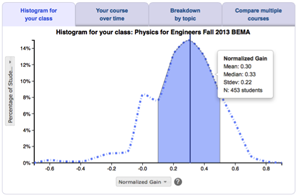Developed by: Christopher D. Porter, Taylor Murphy, Humberto Gilmer, and Andrew Heckler


middle schoolhigh schoolintro collegeinter-mediateupper levelgrad school other





Overview
What? Guided group material for common graduate-level core courses: Classical Mechanics, Statistical Mechanics, Quantum Mechanics, and E&M. Questions, short keys for students, and full worked solutions for instructors are available.
Why? These materials are useful for improving student understanding of important graduate-level concepts and skills in each topic. Compared to traditional lecture format, the group-work format offers another kind of learning opportunity for students and can facilitate more student engagement.
Why not? While the materials are written to cover standard topics in graduate core courses, they may not cover material relevant for your course.
Activity outline
The guided group work sessions were designed to take place once per
week for each core course, and each session lasts 1 h. The students work in groups of 3 or 4 questions that range from conceptual to calculational, and the instructor circulates to see if students are on track and facilitate progress if help is needed. More details of group work methods are in Section II.B. in Porter and Heckler 2020. Here are some points from that paper:
Once graduate students are engaged, they tend to require less external prompting than might be required in undergraduate group work sessions. For example, a common practice in introductory group work is to withhold answers until near the end of class, and withhold full solutions entirely. This is done for good reasons, but these reasons do not seem as relevant for graduate students.
Graduate students tend to not wait complacently for answers to be given, knowledge that an answer would be shared did not seem to diminish their discussions, and giving an answer did not end debate, but often rekindled a discussion. As a result, answers were often shared as the session progressed, rather than strictly at the end.
Graduate students tend to express a need for group autonomy in the group work sessions. This includes the ability to check answers as needed, as described above, and also the ability to skip some questions. One effective measure against students skipping over a problematic area is the sharing of answers throughout the session, and verbally emphasizing tricky problems or often-unexpected answers. This gives students the freedom to pursue the questions most interesting to their group, but ensures that they give additional consideration before skipping a question entirely.
Graduate students vary in their willingness to discuss problems and interact with each other. Some students are excited to work on physics problems in a discussion format, while others are very shy, and in some cases fearful of exposing knowledge gaps or misunderstandings. Although this was not studied rigorously, one should keep in mind that this fear may be more
pronounced among graduate students than among undergraduates, given how entangled physics expertise may be with the identity of a physics graduate student. Tension was
effectively diffused in GGW sessions in several ways, including providing snacks, which initiated discussion naturally. Another way of validating students’ initial understanding was the explicit inclusion of common student misunderstandings in problem stems in the group work material—a technique commonly used in undergraduate tutorial materials.
Topic outline
Graduate Quantum Mechanics Semester 1
Tutorial 1: Diffraction, Compton Scattering, Bohr Atom, and the Photoelectric effect
Tutorial 2: Integrals, F.T. transforms, infinite square wells
Tutorial 3: Wells and parity (pick the stuff that looks interesting)
Tutorial 5: Unitary and Hermitian matrices, functions of operators, commutators, and time-dependence
Tutorial 6: Operators (from last time) + Harmonic oscillators, ladder operators, and coherent states
Tutorial 8: Spin, expectation values, uncertainty, and time-evolution
Tutorial 9: Spherical Coordinates and H atom
Tutorial 10: H atom and 2-particle systems
Graduate Quantum Mechanics Semester 2
Tutorial 1: Particles in EM fields
Tutorial 2: Dirac Equation I
Tutorial 3: Dirac Equation II
Tutorial 4: Addition of Angular Momentum
Tutorial 5: Review of Indistinguishable Particles
Tutorial 6: Perturbation Theory basics
Tutorial 7: Time-dependent Perturbation Theory
Tutorial 8: Quantum Computing and Teleportation
Graduate Electromagnetism (2 semesters)
Graduate Classical Mechanics Semester 1
Tutorial 1: Getting tarted
Tutorial 2: The principle of stationary action
Tutorial 3: The central force problem
Tutorial 4: Oscillations I
Tutorial 5: Oscillations II
Tutorial 6: Fourier transformations
Tutorial 7: Non-inertial reference frames
Tutorial 8: An interlude for math methods
Graduate Statistical Mechanics Half-Semester
Tutorial 1: A reintroduction to statistical systems
Tutorial 2: Microcanonical ensemble I
Tutorial 3: Microcanonical ensemble II
Tutorial 4: Canonical ensemble I
Tutorial 5: Canonical ensemble II
Student skills developed
- Conceptual understanding
- Problem-solving skills
- Using multiple representations
Instructor effort required
- Medium
Resources
Research
This is the second highest level of research validation, corresponding to:
- at least 1 of the "based on" categories
- at least 2 of the "demonstrated to improve" categories
- at least 4 of the "studied using" categories
Research Validation Summary
Based on Research Into:
- theories of how students learn
- student ideas about specific topics
Demonstrated to Improve:
- conceptual understanding
- problem-solving skills
- lab skills
- beliefs and attitudes
- attendance
- retention of students
- success of underrepresented groups
- performance in subsequent classes
Studied using:
- cycle of research and redevelopment
- student interviews
- classroom observations
- analysis of written work
- research at multiple institutions
- research by multiple groups
- peer-reviewed publication
References
- A. Heckler and C. Porter, Graduate student understanding of quantum mechanical spin, presented at the Physics Education Research Conference 2022, Grand Rapids, MI, 2022.
- C. Porter and A. Heckler, Effectiveness of guided group work in graduate level quantum mechanics, Phys. Rev. Phys. Educ. Res. 16 (2), 020127 (2020).





